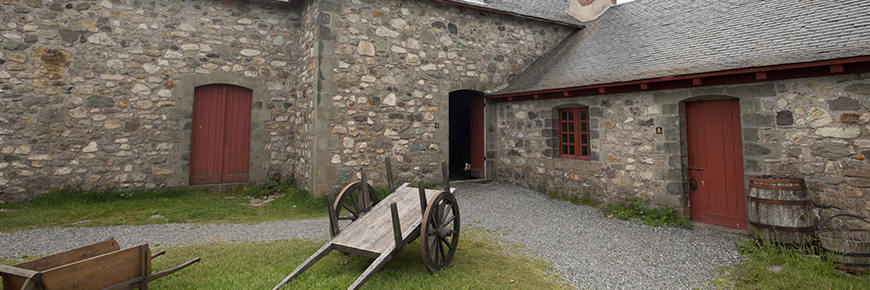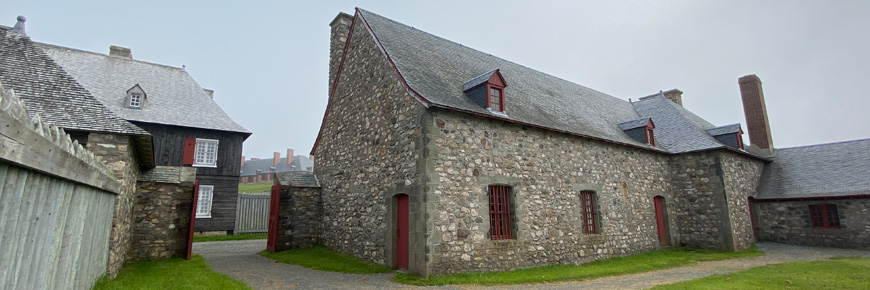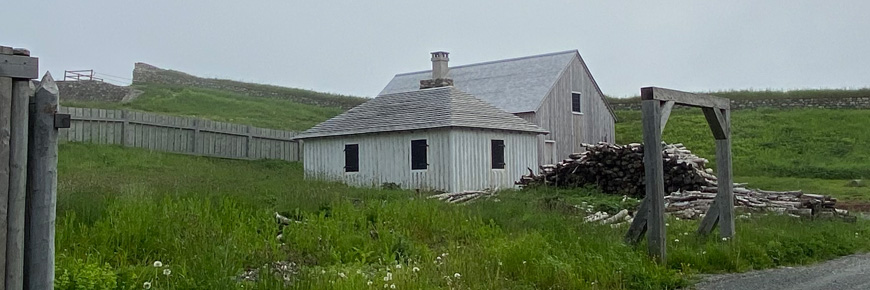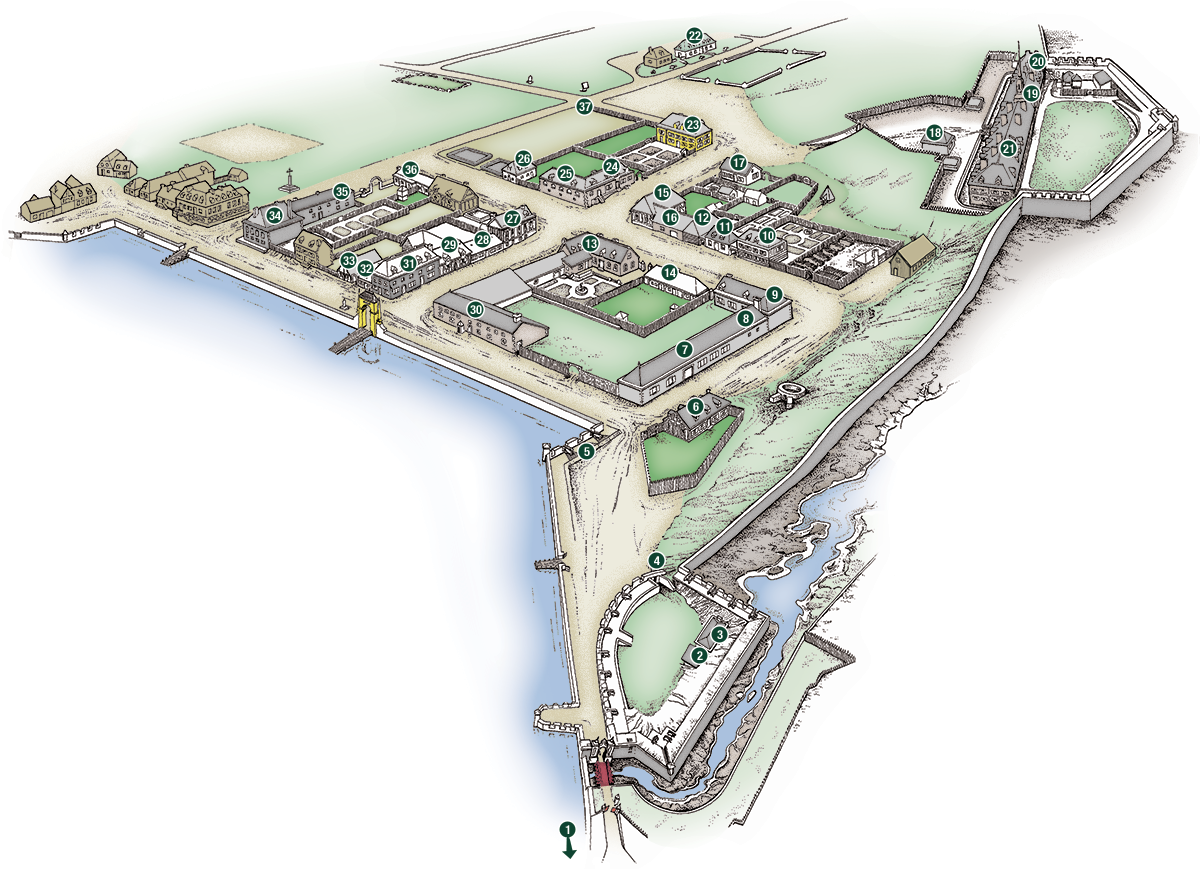
The King's Bakery
Fortress of Louisbourg National Historic Site
That smell of baking bread is characteristic of the 18th century town. Most people got most of their nutrition from bread, and this colony without farms brought in 500 pounds of flour per colonist every year, mostly from Canada. Crop failures there threatened this supply in the 1740s, and shortages loomed on the eve of war.
Several commercial bakeries competed to serve the townspeople, while this royal one, finished in 1732, supplied the garrison. The four bakers employed here lived upstairs. To the troops they doled out one six-livre loaf per man every four days. A little salt pork and some dried vegetables completed the soldiers’ rations.
The original bakery was destroyed by a fire that also claimed the artillery storehouse in 1756, but the floors have been preserved intact in this reconstruction. Here visitors may buy a loaf of soldiers’ bread, baked daily in these ovens from a dough of 80% whole wheat and 20% rye flour.

The Armoury and Armourer's Forge
On the upper floor of the building housing the bakery, the armoury stored more than 2,000 muskets and small arms for distribution to the troops and militia. In the small forge on the ground floor the armourer undertook repairs and moulded musket shot.
The basic infantry weapon of the compagnies franches de la Marine at Louisbourg was the 1734 flintlock musket made at Tulle in France. Today the troops carry precise reproductions unique to the fortress - ask a soldier to demonstrate the use his weapon, or watch a corporal’s guard at musket drill.

Woodlot
Look about you and count the chimneys. Louisbourg has cold climate, and wood fires were the only source of heat and cooking during most of the town’s existence. As nearby hills and riverbanks were stripped bare, the cost of firewood rose, and Louisbourg’s last years saw a shift to coal-burning stoves.
In the 1740s the barracks, guardhouse and royal properties requisitioned 620 cords of firewood a year, supporting a lively wood trade and keeping this woodlot busy. The high fence limited pilferage; the little log building may have housed a clerk from the royal stores.
Related links
- Desroches House
- Dauphin Demi-Bastion and Gate
- Embrasures at Lartigue
- Lartigue House
- Artillery Storehouse and Forge
- Duhaget Property
- De la Perelle Property
- Engineer's Property
- Rodrigue Property
- De Gannes Property
- The King's Bastion
- McLennan Centre
- Through the town to the quay / De la Plagne Property
- De la Vallière Property
- Carrerot Property
- Benoist Property
- L’Epée Royale
- Magasin du Roi (King's Storehouse)
- Hôtel de la Marine
- Grandchamp Property
- Frédéric Gate
- Commissaire-Ordonnateur’s Property
- Marie Marguerite Rose plaque
- Eastward along the Quay
The reconstructed site

| On the map | Building name |
|---|---|
| 1 | Desroches House (Wheelchair accessible) |
| - | Dauphin Gate |
| - | Dauphin Demi-Bastion |
| 2 | Powder Magazine |
| 3 | Barracks |
| 4 | Postern Tunnel |
| 5 | Embrasures at Lartigue |
| 6 | Lartigue House (Wheelchair accessible) |
| - | Lime Kiln |
| 7 | Artillery Storehouse |
| 8 | Artillery Forge |
| 9 | King's Bakery Food service |
| - | Woodlot |
| 10 | Duhaget House (Wheelchair accessible) Garrison and Fortifications Exhibit |
| - | Icehouse |
| 11 | De la Perelle House (Wheelchair accessible) Congrégation de Notre-Dame Exhibit |
| 12 | De la Perelle Storehouse |
| 13 | Engineer's Residence |
| 14 | Laundry and Stables |
| 15 | Rodrigue House |
| 16 | Rodrigue Storehouse |
| 17 | De Gannes House (Wheelchair accessible) |
| 18 | Guardhouse |
| - | King's Bastion |
| 19 | Military Chapel |
| 20 | Governor's Apartments |
| On the map | Building name |
|---|---|
| 21 | King's Bastion Barracks Reconstruction, Tools of War, and Archeological Typography Exhibits |
| - | King's Garden |
| 22 | McLennan Centre (Wheelchair accessible) (Wifi available) Virtual Reality Experience |
| 23 | De la Plagne (Wheelchair accessible) (Information) |
| 24 | De la Vallière House Mi'kmaw Interpretive Centre |
| 25 | De la Vallière Storehouse |
| 26 | De la Vallière Storehouse II |
| - | Fizel and Loppinot Properties |
| - | Dugas House |
| 27 | Carrerot House Building Techniques Exhibit |
| 28 | Benoist House (Wheelchair accessible) (Gift shop) |
| 29 | L'Épée Royale Café (Wheelchair accessible) Food service |
| 30 | King's Storehouse |
| 31 | Hôtel de la Marine (Wheelchair accessible) Food service |
| 32 | Grandchamp House (Wheelchair accessible) Food service |
| - | Frédéric Gate |
| - | Carcan |
| 33 | Grandchamp Inn (Wheelchair accessible) Food service |
| - | Destouches House |
| 34 | Ordonnateur's Residence (Wheelchair accessible) Recollecting Lives Exhibit & Harbour Gallery |
| 35 | Bigot Storehouse |
| 36 | Stables |
| - | Louisbourg Cross |
| 37 | Marie Marguerite Rose plaque |
| - | Eastward along the Quay |
| - | Ruins Walk |
- Date modified :